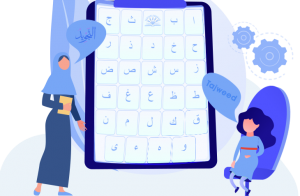What Are the Ten Qirat and How to Learn Them Online?
The ten Qirat are not just different voices or styles; they involve slight variations in pronunciation, letters, and Harakat. Acquiring them is like realizing the dialectal variations between American and British English. Comparably, several tribes had distinct dialects including the Quraishi dialect, Yaman dialect, and others under the Prophet Muhammad (PBUH).
The angel Jibreel (AS) sang the Quran to the Prophet (PBUH) in one language when it was revealed. To honor the linguistic variety of the Arabian Peninsula, Allah let the Quran be said in seven dialects upon the Prophet’s (PBUH) request. The ten Qirat originated in these seven dialects, sometimes known as the 7 Qirat of Quran.
Enrolling in an online qirat course with TarteelQuran guarantees you learn under qualified and experienced teachers if you want to master the 7 Qirat of Quran and extend to the complete ten Qirat.
Evolution of the Ten Qirat
The process of the Quran’s revelation and its transmission is well-documented in Islamic history. Over time, the seven ahruf (dialects) led to the establishment of recognized schools of Qira’at. These schools are divided into two main categories:
Here are the 3 Hadith on this:
Learn Ten Qirat
1) Ibn ‘Abbaas reported that the Prophet (PBUH) said, “Jibreel recited the Qur’aan to me in one harf, and I recited it back to him, but I requested him to increase (the number of harf) and he continued to increase it for me until we stopped at seven ahruf.” Ibn Shihaab az-Zuhree (d. 124 A.H.), one of the narrators of the hadeeth, said, “It has reached me that these seven ahruf are essentially one (in meaning), they do not differ about what is permitted or forbidden.” 383
2) ‘Ubay ibn Ka’ab reported that the Prophet (PBUH) was once on the outskirts of Madeenah (near the tribe of Banoo Ghifaar) when Jibreel came to him and said, “Allaah has commanded that you recite the Qur’an to your people in one harf.” The Prophet (PBUH) replied, “I ask Allaah’s pardon and forgiveness! My people are not capable of doing this!” Jibreel then came again and said, “Allaah has commanded you to recite the Qur’an to your people in two ahruf.”
The Prophet (PBUH) again replied, “I ask Allaah’s pardon and forgiveness! My people are not capable of doing this!” Jibreel then came a third time and said, “Allaah has commanded you to recite the Qur’aan to your people in three ahruf.” The Prophet (PBUH) replied for a third time, “I ask Allaah’s pardon and forgiveness! My people are not capable of doing this!” At last, Jibreel came for the fourth time, and said, “Allaah has commanded you to recite the Qur’an to your people in seven ahruf, and in whichever harf they recite, they would be right. 384”
3) ‘Umar ibn al-Khattab narrated, “I was sitting in the masjid when I heard Hishaam ibn Hakeem recite Soorah al-Furqaan. I was almost about the jump on him in his prayer, but I waited until he finished, and then grabbed him by his garment and asked him, ‘Who taught you to recite in such a manner?’” He replied, ‘It was the Prophet (PBUH) himself!’ I responded, ‘You are mistaken, for indeed I learned this soorah from the Prophet (PBUH) and it was different from your recitation!’
Therefore, I dragged him to the Prophet (PBUH) and complained to him that Hishaam had recited Soorah al-Furqaan in a manner different from what he (PBUH) had taught me. At this, the Prophet (PBUH) told me to let go of Hishaam, and asked him to recite Soorah al-Furqaan. Hishaam recited the Soorah in the same way I had heard him before. When he finished, the Prophet (PBUH) said, ‘It was revealed this way.’ He then asked me to recite the same soorah. When I had finished, he (PBUH) said, ‘It was (also) revealed this way. Indeed, the Qur’aan has been revealed in seven different ahruf, so recite whichever one is easy for you.’” 385.
In conclusion, the Holy Quran was recited in seven different dialect that was allowed by Allah based upon 7 different dialect at that time in the Arabian Peninsula. After the death of the Prophet, the Companions understood it and spread it to others as well. But the once Islam spread and people of different Areas met, they found these differences. For this once Companmion suggested the Khalifah Usman Bin Affan (RA) combine the Ummah on one Mushaf (Book). The Khalifah chose the Qureshi dialect for the Ummah. Other Mushaf was forgotten. But the seven recitations remain in the society from the Qureshi Mushaf in reading only not in the shape of books.
The below video will help you understand more.
Within the Learn Ten QiratQira’at, there are two categories:
1) Mutawatir Qira’at – Widely transmitted with chains of authorities so extensive as to rule out error.
2) Mashhur Qira’at – Slightly less widely transmitted but still reliable and authentic.
The Seven Mutawatir Qira’at are:
1) Nafi’ (d. 169/785)
2) Ibn Kathir (d. 120/737)
3) Abu ‘Amr ibn al-‘Ala’ (d. 154/762)
4) Ibn ‘Amir (d. 154/762)
5) ‘Asim (d. 127/744)
6) Hamza (d. 156/772)
7) al-Kisa’i (d. 189/904)
The three Mashhur Qira’at are:
1) Abu Ja’far (d. 130/747)
2) Ya’qub (d. 205/820)
3) Khalaf (d. 229/843)
By enrolling in TarteelQuran’s online qirat course, you can study all ten Qira’at with a focus on both theory and practical application.
Final Thought
Learning the Quran is a very fulfilling path; mastery of the 7 Qirat of Quran or even the whole 10 Qirat is evidence of one’s commitment to grasp the Book of Allah. Using TarteelQuran’s online qirat course, you will be able to access world-class instructors and a tested approach for learning ten Qirat at your speed. Seize this chance to improve your relationship with the Quran using its several recitation forms.
Why Learn Ten Qirat Online?

Learning ten Qirat online lets students interact with professional teachers who can walk them methodically toward perfecting the art of Quranic recitation. Online sites guarantee students reach mastery in the recitation techniques of the 7 Qirat of Quran and beyond by offering flexibility, organized courses, and interactive lessons.
Course Provider: Organization
Course Provider Name: TarteeleQuran
Course Provider URL: www.tarteelequran.com
5









